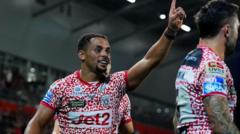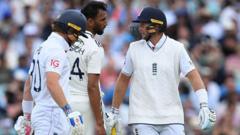
Arms, legs and adrenaline pumping, I kept my eyes focussed on the finish line that was now within my grasp.
It was a hot and windy day but the conditions had done little to slow me down. In fact, earlier in the race I’d thought I might be able to finish in the top five.
In the end, in October 2023, I achieved a 7th place finish in the World Cup Triathlon race in Tangier.
As an Olympic Bronze medalist, World Champion and Commonwealth medalist, you might think I’d be disappointed with that result, but you’d be wrong. Because while it won’t go down as my best race, it was one of the most emotional ones of my long career.
That race took place exactly eight months and three days after I gave birth to my daughter, Emmie. It was my first race as a new mum and my first competition back after nearly two years out of the sport.
I’m lucky in that I’ve had the support from British Triathlon (and my family) to try to balance motherhood and an elite sports career. But sadly, this is not the case for other women.
In the ‘normal’ working world, basic maternity rights are covered by law and a company can then choose their own specific policy: Allowing women a longer period of maternity leave or a higher percentage of full pay, for example.

Yet we are still struggling to get this aligned in elite sport.
Currently, some contracts are still not protected by maternity clauses, and other people have lost sponsors after not being able to return to the sport.
It’s why, for some, the choice between being a mum or retiring still exists, and why, for those who do choose to return, finding the time to train and pushing aside the guilt once we have children can be so crippling.
The commitment needed to be a professional athlete is above and beyond that of many jobs. The focus and dedication and self-centred way of living are often what make athletes great and you have to change those things when you become a mother.
You feel torn and question regularly whether you are doing the right thing for you and your family. I’m sure that’s relatable to many working mums, however self-doubt and second guessing oneself kills athletic performance and that’s something I definitely struggled with at times on my own journey back to the top.
Personally, I knew I wanted to have a child after the Tokyo Olympics. Getting to those games had already been a challenge – Covid had made training and travelling a lot more complicated, and I was beginning to struggle with a mysterious shoulder issue – and frankly, I was burnt out.

It felt like the best time to start a family and after that I would see whether I wanted to return to triathlon or not.
My last race ended up being in November 2021, where I came 10th in a World Championship Series event. Then, six months later, I fell pregnant.
While I’d have loved to be active during my pregnancy, I was struggling with significant pain throughout my body – I wouldn’t discover this was rheumatoid arthritis until I was seven weeks postpartum.
With all that going on there also remained the question of whether I would return to professional triathlon or not. I didn’t know whether I would be able to or even if I wanted to.
The more I thought about it, though, the more I realised I wanted the opportunity to finish my career on my terms.
By the time Emmie was born in January 2023, my fitness and strength were at the lowest point they had ever been and there was a moment when I wasn’t sure if I would ever get back to a start line.

Fortunately for me, triathlon is relatively unique in that its roots are founded in equality – being a relatively young sport, women and men have always raced over the same distances and received the same prize money and exposure – and I had the full support of British Triathlon behind me.
They gave me time, patience and, importantly, flexibility. I was allowed to bring Emmie with me to races and take on solo training in order to work around her needs and childcare arrangements. All this and more allowed me to steadily return to the sport I loved once I felt ready to do so.
Don’t misunderstand, it was still a long road to get back to racing.
At times I doubted whether it was worth it, whether I could balance training and life as a mother, if my body would allow me to do it or if I wanted to leave my daughter to jet off to other continents to race.
Eventually though, I became their first athlete to return to international competition following pregnancy.
As I stood on the start line on the beach in Tangier, I was nervous. I had absolutely no idea how I would perform again now that my training, lifestyle and even my body were different, but I was also immensely proud to be there.

(Picture: Stephen Cox Photo/British Triathlon)
Seventh place felt like a huge achievement. Not only had I proven to myself I could be a professional athlete again but it made me excited about what I could still achieve.
From there, I went on to win a major title again – the European Championship – in September 2024.
Winning a medal as a mum in an event I’d targeted all year and a fourth place finish at the World Championships in October was the ultimate high to end on, so at the end of that season I retired for good.
I felt like I’d come full circle, like I’d made it back to the top in every sense. And now any other woman who had dreams of both a professional sports career and motherhood could see it was achievable because I’d lived it.
And, I’m pleased to say, progress is steadily being made to pave the way for more mothers and athletes like me.
UK Sport have guidelines that encourage sports to retain elite athletes’ funding should they fall pregnant and give them time to prove they can return to a certain level – which is what British Triathlon used to help me.

And earlier this year, British Triathlon introduced a pregnancy deferral policy for their age group athletes. This means that any athlete (who qualifies to represent GB at European and World Championships in their age group category) that becomes pregnant before a major event can now defer their entry for up to two years.
This allows space and opportunity to return to triathlon after having a baby at a time that works for them.
Another new policy allows elite triathletes (including Olympic and Para-athletes) to also retain their funding for two years if they become pregnant and World Triathlon – our international governing body – have also introduced a two-year freeze on rankings.
All this is a huge step forward, but more still needs to be done.
It seems crazy to me that women’s maternity rights have only been protected in sport for a few years and even then, the story is mixed across different sports. We must keep pushing forward.
I never imagined that the six-year-old me – who was inspired by watching the Barcelona Olympics on TV in 1992 and seeing Linford Christie win a gold medal – ever dreamed she’d be World Champion, Great Britain’s first ever female Olympic triathlon medalist, a Commonwealth Games medalist and a European Champion after having a baby, but here we are.
I’m just fortunate that, in the final chapter of my athletic career, I had a chance to set an example for the women who come after me. It’s that legacy, for Emmie (if she ever wants to follow in her mum’s footsteps) and other young girls that I am most proud of.
That’s why I will continue to work with others to make sure that choice between being a top-level athlete and a mum is one they should never have to make.
Do you have a story you’d like to share? Get in touch by emailing [email protected].
Share your views in the comments below.







.jpg.webp?itok=1zl_MpKg)





 Bengali (Bangladesh) ·
Bengali (Bangladesh) ·  English (United States) ·
English (United States) ·